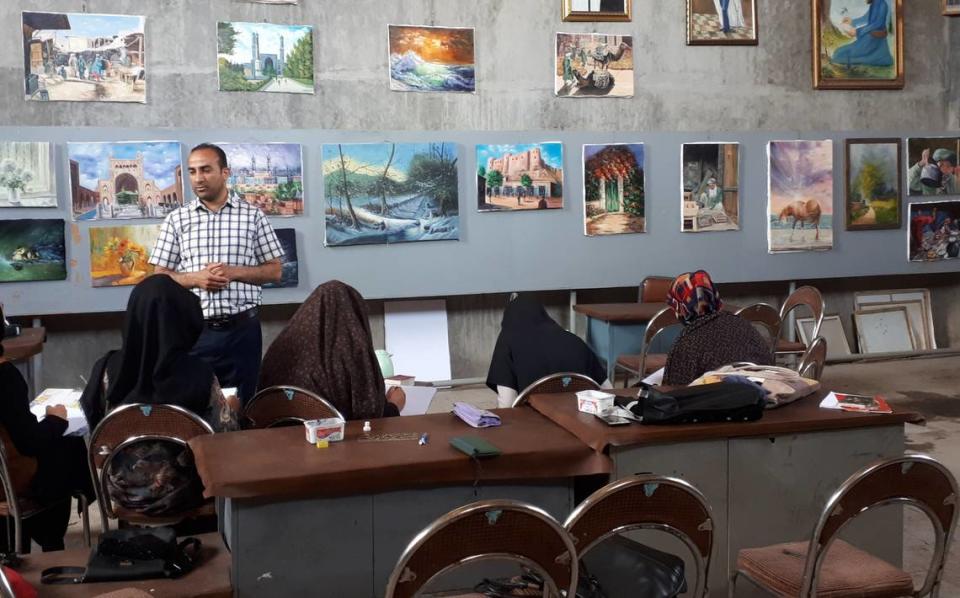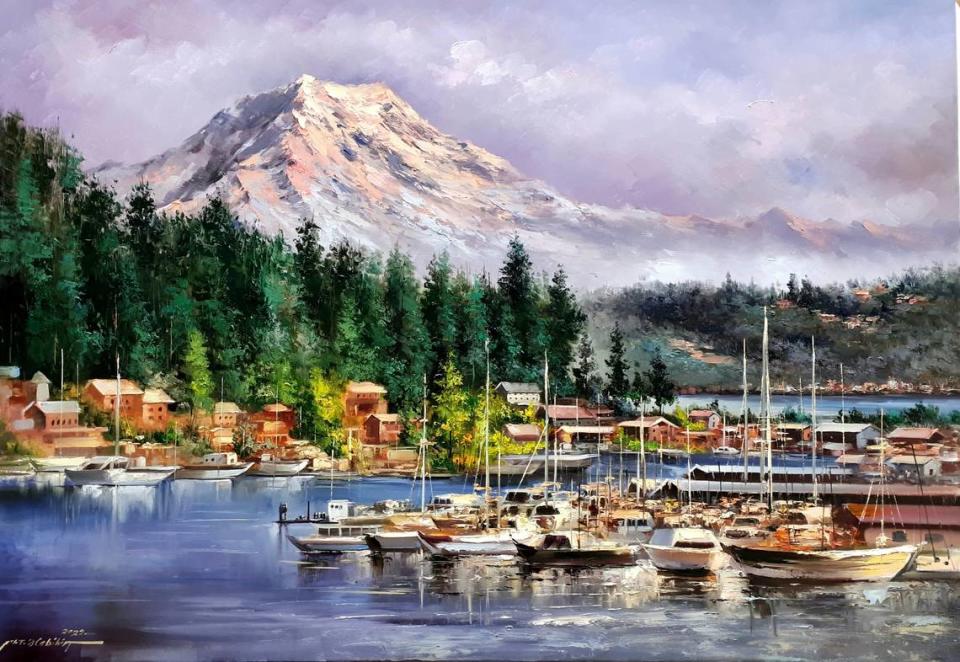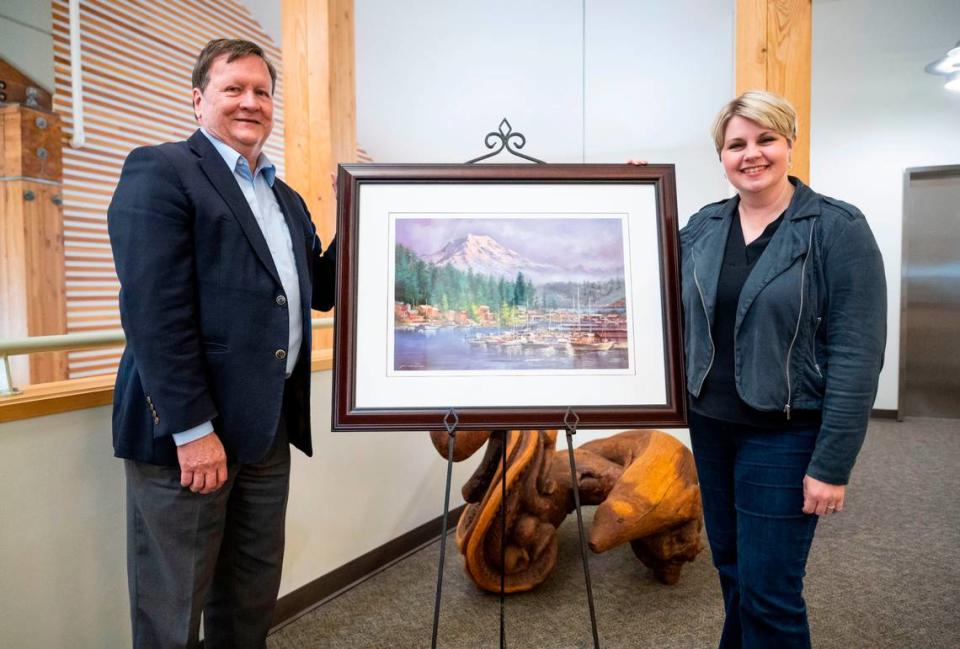An Afghan artist hoped to teach in Pierce County. His visa was denied at the last step
- Oops!Something went wrong.Please try again later.
Abdul hoped to teach art at high schools in Pierce County, but a denied visa is forcing the Afghan artist to try to find safety with his family in another country.
Upon taking control of Afghanistan’s government again in August 2021, the Taliban quickly issued edicts banning music and “art of living things.” That means Abdul cannot teach girls or women, or publicly display and sell art in Afghanistan that shows people or animals.
As a result, he cannot provide for his family through his art and was forced to close his art gallery and school.
“I can no longer have a painting exhibition, nor teach painting to girls and women,” Abdul previously told the Gateway via WhatsApp from Afghanistan. “My paintings are not sold in Afghanistan, and the Taliban do not value my art. I wish to be able to have painting galleries in America show my art and express my feelings easily and teach American people to paint. I love painting and teaching and I hope the good people of America will help me achieve my dreams.”
Abdul, 35, has been painting since he was 15 years old.
He asked that the Gateway only publish his first name, out of concern for his safety and the safety of his family.
After receiving threats from the Taliban and their attempts to find Abdul, he took his wife and three young children and went into hiding.

They’ve been in hiding, staying with friends in Afghanistan since October 2021. Abdul and his wife had a fourth child in December 2022.
Shortly after going into hiding, Abdul contacted an old friend, Timothy Ham, for financial support and help to flee Afghanistan to America. Ham first met Abdul in 2008 when Ham attended an award ceremony at Abdul’s art school.
At the time Ham worked as the Western Regional Manager on the U.S. Agency for International Development-funded Afghanistan Small & Medium Enterprise Development project in Afghanistan.
Abdul was an instructor and co-owner of the art school with his father.
After learning of Abdul’s current status, Ham was determined to help find a way to bring Abdul to the United States.
“Abdul has a unique gift as an artist with the ability to paint not only what he sees, but also what he feels. Each painting has a story. I am grateful for the two years I spent in Afghanistan and saddened by the pain Afghans have had to endure from decades of war and conflict. I did not know exactly how I would help Abdul and his family but at least I could try,” Ham previously told the Gateway.
In an effort to raise funds to come to America, Abdul shipped Ham 56 original oil paintings to distribute for donations to help pay for Abdul’s application for a work visa to the U.S.

One of these paintings was a portrait of the Gig Harbor waterfront, painted from a photo that Ham sent Abdul. That painting was given to a Gig Harbor couple, Mike and Pat Harle, for their donations to support Abdul’s journey.
The original painting remains in the Harles’ home. They allowed it to be digitally scanned and framed by Tammy and Craig Radford with the American Art Company of Tacoma.
That copy was donated to the city of Gig Harbor on March 29. City officials are deciding where they want to put it.

Funds from all the paintings were set to help with any future living expenses, visa costs and travel.
In June of 2022, Abdul and his attorneys applied for an O-1 Artist Visa from the U.S. as an artist of “extraordinary abilities.”
The visa was preliminarily granted to Abdul in July 2022 and a final visa interview was the last step.
In August 2022 Abdul and his family traveled to the U.S. Embassy in Pakistan for this final interview.
The consular officers denied the family access to the U.S. because they felt Abdul could not assure he would return after his one-year teaching contract was completed, said Abdul’s attorney, Sanjay Sethi from the Law Offices of Sethi & Mazaheri, LLC in New Jersey.
The job Abdul had lined up involved working in art classrooms in Tacoma, primarily at the School of the Arts, alongside certified teachers as a teaching assistant.
The visa denial stated that he had not demonstrated that he had ties that would compel him to return to his home country.
Abdul had hoped to work on a documentary film in another country after teaching for a year in the U.S., but that opportunity wasn’t confirmed in time for the visa interview.
Abdul and his family were forced to return to Afghanistan.
After exploring several other options for a second visa interview, Abdul and his attorneys decided to submit an application for a humanitarian visa for Germany for the family, which the attorneys have seen work for other Afghan artists.
In the first five months after the U.S. withdrew all U.S. forces from Afghanistan, Sethi’s office had 3,000 immediate inquiries for assistance from artists.
“German humanitarian visa regime is much more accommodating,” Sethi told the Gateway. “They have a humanitarian visa regime that actually can bring people in much quicker and also directly.”
Sethi’s office has resettled about 3-4 times as many artists to Europe than to the United States, Sethi said.
If the system in Germany functions as it should, Abdul’s attorneys are hopeful Abdul and his family will be approved in the near future.
Abdul is grateful to the city of Gig Harbor and to Tacoma.
“I hope to visit this region one day and show my children your love and appreciation for an Afghan artist by displaying this print,” Abdul said in a WhatsApp message. “I am glad that many of my paintings are now in the homes of people in America, including Mike and Pat Harle.”
The German government has not informed Abdul of its decision yet.
What was waiting for Abdul in Tacoma
A position with Elements of Education was waiting for Abdul, if he made it to Tacoma.
Elements of Education is a nonprofit founded over 20 years ago in Tacoma. The organization created the School of the Arts, the Science and Math Institute, and the School of Industrial Design, Engineering and Art.
Elements of Education agreed to make Abdul an employee, if funds for a salary were raised, Jon Ketler, co-director of Elements of Education previously told the Gateway.
Individuals made donations on their own without expectations of prints or paintings. Donations to Elements of Education were for his first-year base wages and could only be used once 100% of his wages of $44,500 had been deposited.
Since Abdul and his family cannot come to the U.S., Ham asked Elements of Education to return all donations to donors.
Ham informed the donors of the reasons for this and suggested that they could also provide donations to a GoFundMe account established to support the family, and for visa fees and travel to a German embassy. Donations can be made at gofundme.com/f/rescuing-an-afghan-artist-and-family.
Ham just wants Abdul to be able to leave Afghanistan.
“If he and his family are allowed to leave Afghanistan to a country where he can once again paint what he wants to express, I will be very happy for him and his family,” Ham told the Gateway. “We were all disappointed that he was not allowed to come to the U.S. but, should the family get to a country that would allow him to travel, at least from there he will hopefully be able to come to the U.S. to visit and exhibit his own works. At least if he were safe in another country, I could go there to visit with him and his family.”

